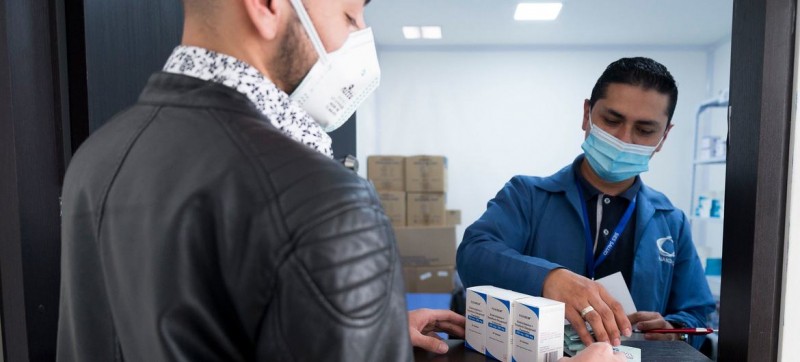A man receives his HIV medication during the COVID-19 pandemic in Colombia. The UN health agency on Thursday recommended the use of a new long-acting “safe and highly effective” prevention option for people at “substantial risk” of HIV infection, known as cabotegravir (CAB-LA). New World Health Organization (WHO) guidelines advise countries to use the new potentially game-changing drug which is not yet available for sale, as a pre-exposure prophylaxis (PrEP) for HIV, and as part of a comprehensive approach to prevent the virus from spreading.
Those using most PrEP medications on the market, have to remember to take their medication daily, a greater challenge for what is a preventative medicine.
“Long-acting cabotegravir is a safe and highly effective HIV prevention tool, but isn’t yet available outside study settings,” said Meg Doherty, Director of WHO’s Global HIV, Hepatitis and Sexually Transmitted Infections Programmes.
The drug was approved in the United States last December, and the United Kingdom the following month.
Critical moment
Key populations – including sex workers, men having sex with men, intravenous drug users, people in prisons, transgender individuals, and their sexual partners –accounted for 70 per cent of global HIV infections last year.
Moreover, 4,000 new infections that occurred every day in 2021, were within that group.
As HIV prevention efforts have stalled, the new guidelines were released ahead of the 24th International AIDS Conference (AIDS 2022) – which officially begins on Friday – with 1.5 million new HIV infections last year, the same as in 2020.
“We hope these new guidelines will help accelerate country efforts to start to plan and deliver CAB-LA alongside other HIV prevention options, including oral PrEP and the dapivirine vaginal ring,” said the WHO official.
Game-changer drug
CAB-LA is an intramuscular injectable, long-acting form of PrEP.
The first two injections are administered four weeks apart, followed thereafter by an injection every eight weeks.
In randomized controlled trials, the antiretroviral was shown to be safe and highly effective among cisgender women, cisgender men who have sex with men, and transgender women who have sex with men.
Together, these landmark studies found that use of CAB-LA resulted in a 79 per cent relative reduction in HIV risk compared with oral PrEP, where adherence to taking daily oral medication was often a challenge, according to WHO.
Long-acting injectable products have also been found to be acceptable and sometimes preferred in studies examining community PrEP preferences.

A woman is tested for HIV in Uttar Pradesh, India.
Coalition force
The UN health agency also launched a new coalition to accelerate global access to the drug.
Convened by WHO, Unitaid, UNAIDS and The Global Fund, the coalition will identify interventions needed to advance near and long-term access to CAB-LA, establish financing and procurement for the drug, and issue policy guidance, among other activities.
“To achieve UN prevention goals, we must push for rapid, equitable access to all effective prevention tools, including long-acting PrEP,” said Rachel Baggaley, WHO’s Lead of the Testing, Prevention and Populations Team at Global HIV, Hepatitis and STI Programmes.
“That means overcoming critical barriers in low and middle-income countries, including implementation challenges and costs.”
Key actions
WHO will continue to support evidence-based strategies to increase PrEP access and uptake, such as through adopting and including CAB-LA in HIV prevention programmes.
It is also working with Unitaid and others to develop projects that answer outstanding safety issues and implementation challenges.
And the WHO Global PrEP Network will host webinars to provide up-to-date information on CAB-LA to increase awareness.
In April, it was added to WHO’s list of Expressions of Interest for prequalification evaluation by the health agency.
Prevention choices
Both oral PrEP and CAB-LA are highly effective.
The new CAB-LA guidelines are based on a public health approach that considers effectiveness, acceptability, feasibility and resource needs across a variety of settings.
They are designed to help CAB-LA delivery and the urgently needed operational research on address implementation and safety and will inform decisions on how to successfully provide and scale up CAB-LA.
The guidelines highlight critical research gaps, and also recognize that accessing current PrEP services are challenging for some.
“Communities must be involved in developing and delivering HIV prevention services that are effective, acceptable and support choice,” WHO spelled out.




Comments are closed.